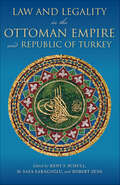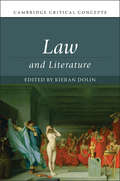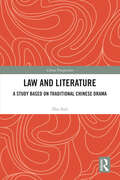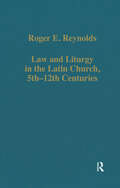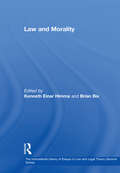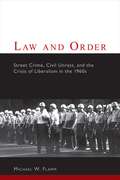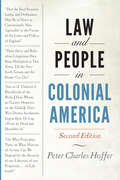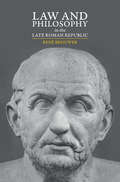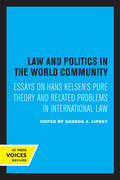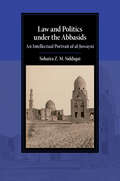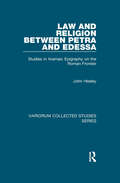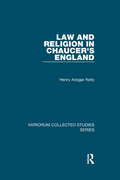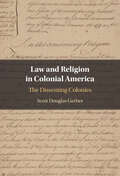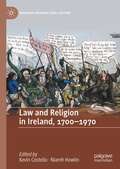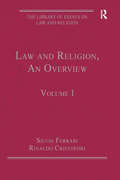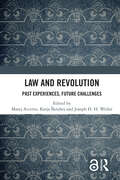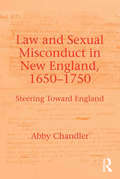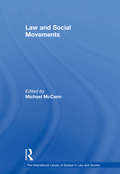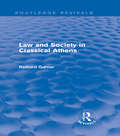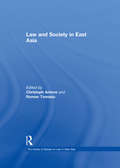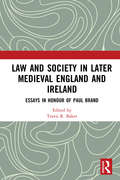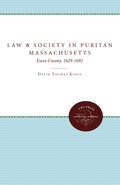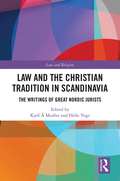- Table View
- List View
Law and Legality in the Ottoman Empire and Republic of Turkey
by Kent F. Schull Robert Zens M. Safa SaraçoğluThe editors of this volume have gathered leading scholars on the Ottoman Empire and the Republic of Turkey to chronologically examine the sweep and variety of sociolegal projects being carried in the region. These efforts intersect issues of property, gender, legal literacy, the demarcation of village boundaries, the codification of Islamic law, economic liberalism, crime and punishment, and refugee rights across the empire and the Aegean region of the Turkish Republic.
Law and Literature (Cambridge Critical Concepts)
by Kieran DolinLaw and Literature presents an authoritative, fresh and accessible new overview of the many ways in which law and literature interact. Written by a team of international experts, it provides a multi-focused history of literary studies' critical interest in ideas of law and justice. It examines the effects of law on writers and their work, ranging from classical tragedy to comics, and from East Africa to Elizabethan England. Over twenty chapters, contributors reveal the intricate and multivalent historical interactions between law and literature, both past and present, and trace the intellectual genesis of the concept of law in literary studies, focusing on major developments in the history of the interdisciplinary project of law and literature, as well as the changing ideas of law, and the cultural contests in which it has figured. Law and Literature will appeal to graduates and scholars working on the intersection between law and literature and in key related areas such as literature and human rights. Provides a multi-focused history of literature's critical interest in ideas of law and justice. Explores how legal concepts and practices contribute to literary studies. Presents a history of law and literature, and its contemporary applications.
Law and Literature: A Study Based on Traditional Chinese Drama (China Perspectives)
by Zhu SuliBased on the texts of traditional Chinese dramas such as The Orphan of Zhao, Liang Shangbo and Zhu Yingtai, The Injustice to Dou E, and The Fifteen Strings of Cash, the book aims to broaden the scope of law and literature in China.Adopting a comprehensive and interdisciplinary approach of legal theory, literature, sociology, economics, and political science, the author analyzes some theoretical issues that are of the law or relevant to law in these literary playscripts, which breaks the Chinese tradition of moral reading and integrates literary study or humanitarian studies into the study of social sciences. In addition, the book discusses the history, status quo, and prospects of law and literature research in China and reflects on its value and methodology.The book will appeal to scholars and postgraduate students of legal theory, Chinese literature, and legal history.
Law and Liturgy in the Latin Church, 5th-12th Centuries (Variorum Collected Studies)
by Roger E. ReynoldsThe two themes brought together in this volume - the canon law and the liturgy of the early medieval Latin Church - have close links, as these articles reveal. At the basis of this lies that fact that the collections and manuscripts with which Professor Reynolds is concerned provide the source material for both fields of study. In the book particular emphasis is given to the Irish Collection canonum hibernensis and its many derivatives, to works from Carolingian Salzburg and eleventh-century Southern Italy, and to liturgical collections. The whole illustrates the need for liturgiologists to be aware of the riches in medieval legal sources, and for legal historians to take account of the wealth of liturgical material that is a principal ingredient of the law of the Church; and demonstrates how much one field can contribute to understanding the development and to the dating of the other. Les deux thèmes réunis dans ce volume - le droit canon et la liturgie de l’Eglise Latine du haut moyan-âge - ont, comme le révèle ce groupe d’articles, des liens très étroits. Ceci reposant sur le fait que les collections et manuscrits, auxquels le professeur Reynolds s’intéresse, apportent la substance se trouvant à la source de ces deux terrains d’études. Dans le livre, une importance particulière est donnée au Collectio canonum hibernensis irlandais et à ses multiples dérivations, ainsi qu’aux travaux issus de Salzburg à l’époque carolingienne à ceux provenant d’Italie méridionale au 11è s. et aux collections liturgiques. L’ensemble illustre la nésessité pour les spécialistes en liturgie d’être conscients de l’abondance de sources légales médiévales et pour les historiens du droit de tenir compte de la richesse en matière liturgique et que forme l’un des ingrédients principaux du droit de l’Eglise; il démontre aussi combien un domaine peut contribuer è la compréhension du développement et à l’assignation de date
Law and Morality: Proceedings Of The 21st World Congress Of The International Association For Philosophy Of Law And Social Philosophy (ivr); Lund, Sweden, 12-18 August 2003 (The\international Library Of Essays In Law And Legal Theory (second Series) Ser. #98)
by Kenneth Einar Himma and Brian BixThis volume collects many of the key essays exploring the possible relationships between the concepts of law and morality, a central concern of contemporary philosophizing about law. It is organized around five conceptual issues: classical natural law theory; legal positivism's separability thesis; Ronald Dworkin's constructive interpretivism; inclusive legal positivism's assertion that there can be legal systems with moral criteria of legality; and the relevance of morality and moral theorizing in theorizing about the concept of law and associated legal concepts. Each of the essays makes an important contribution toward addressing these issues.
Law and Order in Ancient Athens
by Adriaan LanniThe classical Athenian 'state' had almost no formal coercive apparatus to ensure order or compliance with law: there was no professional police force or public prosecutor, and nearly every step in the legal process depended on private initiative. And yet Athens was a remarkably peaceful and well-ordered society by both ancient and contemporary standards. Why? Law and Order in Ancient Athens draws on contemporary legal scholarship to explore how order was maintained in Athens. Lanni argues that law and formal legal institutions played a greater role in maintaining order than is generally acknowledged. The legal system did encourage compliance with law, but not through the familiar deterrence mechanism of imposing sanctions for violating statutes. Lanni shows how formal institutions facilitated the operation of informal social control in a society that was too large and diverse to be characterized as a 'face-to-face community' or 'close-knit group'.
Law and Order: Street Crime, Civil Unrest, and the Crisis of Liberalism in the 1960s (Columbia Studies in Contemporary American History)
by Michael FlammLaw and Order offers a valuable new study of the political and social history of the 1960s. It presents a sophisticated account of how the issues of street crime and civil unrest enhanced the popularity of conservatives, eroded the credibility of liberals, and transformed the landscape of American politics. Ultimately, the legacy of law and order was a political world in which the grand ambitions of the Great Society gave way to grim expectations.In the mid-1960s, amid a pervasive sense that American society was coming apart at the seams, a new issue known as law and order emerged at the forefront of national politics. First introduced by Barry Goldwater in his ill-fated run for president in 1964, it eventually punished Lyndon Johnson and the Democrats and propelled Richard Nixon and the Republicans to the White House in 1968. In this thought-provoking study, Michael Flamm examines how conservatives successfully blamed liberals for the rapid rise in street crime and then skillfully used law and order to link the understandable fears of white voters to growing unease about changing moral values, the civil rights movement, urban disorder, and antiwar protests.Flamm documents how conservatives constructed a persuasive message that argued that the civil rights movement had contributed to racial unrest and the Great Society had rewarded rather than punished the perpetrators of violence. The president should, conservatives also contended, promote respect for law and order and contempt for those who violated it, regardless of cause. Liberals, Flamm argues, were by contrast unable to craft a compelling message for anxious voters. Instead, liberals either ignored the crime crisis, claimed that law and order was a racist ruse, or maintained that social programs would solve the "root causes" of civil disorder, which by 1968 seemed increasingly unlikely and contributed to a loss of faith in the ability of the government to do what it was above all sworn to do-protect personal security and private property.
Law and People in Colonial America
by Peter Charles HofferAn essential, rigorous, and lively introduction to the beginnings of American law.How did American colonists transform British law into their own? What were the colonies' first legal institutions, and who served in them? And why did the early Americans develop a passion for litigation that continues to this day? In Law and People in Colonial America, Peter Charles Hoffer tells the story of early American law from its beginnings on the British mainland to its maturation during the crisis of the American Revolution. For the men and women of colonial America, Hoffer explains, law was a pervasive influence in everyday life. Because it was their law, the colonists continually adapted it to fit changing circumstances. They also developed a sense of legalism that influenced virtually all social, economic, and political relationships. This sense of intimacy with the law, Hoffer argues, assumed a transforming power in times of crisis. In the midst of a war for independence, American revolutionaries used their intimacy with the law to explain how their rebellion could be lawful, while legislators wrote republican constitutions that would endure for centuries.Today the role of law in American life is more pervasive than ever. And because our system of law involves a continuing dialogue between past and present, interpreting the meaning of precedent and of past legislation, the study of legal history is a vital part of every citizen's basic education. Taking advantage of rich new scholarship that goes beyond traditional approaches to view slavery as a fundamental cultural and social institution as well as an economic one, this second edition includes an extensive, entirely new chapter on colonial and revolutionary-era slave law. Law and People in Colonial America is a lively introduction to early American law. It makes for essential reading.
Law and Philosophy in the Late Roman Republic
by René BrouwerThe middle of the second until the middle of the first century BCE is one of the most creative periods in the history of human thought, and an important part of this was the interaction between Roman jurists and Hellenistic philosophers. In this highly original book, René Brouwer shows how jurists transformed the study of law into a science with the help of philosophical methods and concepts, such as division, rules and persons, and also how philosophers came to share the jurists' preoccupations with cases and private property. The relevance of this cross-fertilization for present-day law and philosophy cannot be overestimated: in law, its legacy includes the academic study of law and the Western models of dispute resolution, while in philosophy, the method of casuistry and the concept of just property.
Law and Politics in the World Community: Essays on Hans Kelsen's Pure Theory and Related Problems in International Law
by George A. LipskyThis title is part of UC Press's Voices Revived program, which commemorates University of California Press’s mission to seek out and cultivate the brightest minds and give them voice, reach, and impact. Drawing on a backlist dating to 1893, Voices Revived makes high-quality, peer-reviewed scholarship accessible once again using print-on-demand technology. This title was originally published in 1953.
Law and Politics under the Abbasids: An Intellectual Portrait of al-Juwayni (Cambridge Studies in Islamic Civilization)
by Sohaira Z. SiddiquiAbu Ma'ali al-Juwayni (d.478/1085) lived in a politically tumultuous period. The rise of powerful dynastic families forced the Abbasid Caliph into a position of titular power, and created instability. He also witnessed intellectual upheavals living amidst great theological and legal diversity. Collectively, these experiences led him to consider questions of religious certainty and social and political continuity. He noted that if political elites are constantly changing, paralleled with shifting intellectual allegiances, what ensures the continuity of religion? He concluded that continuity of society is contingent upon knowledge and practice of the Shari'a. Here, Sohaira Siddiqui explores how scholars grappled with questions of human reason and knowledge, and how their answers to these questions often led them to challenge dominant ideas of what the Shari'a is. By doing this, she highlights the interconnections between al-Juwayni's discussions on theology, law and politics, and the socio-political intellectual landscapes that forged them.
Law and Religion between Petra and Edessa: Studies in Aramaic Epigraphy on the Roman Frontier
by John HealeyThe thousands of surviving inscriptions in Middle Aramaic (e.g., in the Nabataean, Syriac and Palmyrene dialects) are an underused resource in the study of the Near East in the Roman period, especially in the study of religion and law. Particularly important was the emergence during this period of new peoples with their cultural roots in Arabia, such as the Nabataeans. This volume collects together, under the interrelated themes of religion and law, twenty-three articles by John Healey, with sections on "Petra and Nabataean Aramaic", "Edessa and Early Syriac" and "Aramaic and Society in the Roman Near East". Individual papers discuss the continuation of "Ancient Near Eastern" culture, the Aramaic legal tradition as well as the development of both written and spoken forms of Syriac and Nabatean.
Law and Religion in Chaucer's England (Variorum Collected Studies #957)
by Henry Ansgar KellyThese essays, in a second collection by Professor Kelly, investigate legal and religious subjects touching on the age and places in which Geoffrey Chaucer lived and wrote, especially as reflected in the more contemporary sections of the Canterbury Tales. Topics include the canon law of incest (consanguinity, affinity, spiritual kinship), the prosecution of sexual offences and regulation of prostitution (especially in the Stews of Southwark), legal opinions about wife-beating, and the laws of nature concerning gender distinction (focusing on Chaucer's Pardoner) and the technicalities of castration. Sacramental and devotional practices are discussed, especially dealing with confession and penitence and the Mass. Chaucer's Prioress serves as the starting point for a treatment of regulations of nuns in medieval England and also for the presence, real and virtual, of Jews and Saracens (Muslims and pagans) in England and conversion efforts of the time, as well as sympathetic or antipathetic attitudes towards non-Christians. Included is a case study on the legend of St Cecilia in Chaucer and elsewhere, and as patron of music; and a discussion of canonistic opinion on the licit limits of medicinal magic (in connection with the ministrations of John the Carpenter in the Miller's Tale).
Law and Religion in Colonial America: The Dissenting Colonies
by Scott Douglas GerberLaw – charters, statutes, judicial decisions, and traditions – mattered in colonial America, and laws about religion mattered a lot. The legal history of colonial America reveals that America has been devoted to the free exercise of religion since well before the First Amendment was ratified. Indeed, the two colonies originally most opposed to religious liberty for anyone who did not share their views, Connecticut and Massachusetts, eventually became bastions of it. By focusing on law, Scott Douglas Gerber offers new insights about each of the five English American colonies founded for religious reasons – Maryland, Rhode Island, Pennsylvania, Connecticut, and Massachusetts – and challenges the conventional view that colonial America had a unified religious history.
Law and Religion in Ireland, 1700-1970 (Palgrave Modern Legal History)
by Kevin Costello Niamh HowlinThis book focuses, from a legal perspective, on a series of events which make up some of the principal episodes in the legal history of religion in Ireland: the anti-Catholic penal laws of the late seventeenth and early eighteenth century; the shift towards the removal of disabilities from Catholics and dissenters; the dis-establishment of the Church of Ireland; and the place of religion, and the Catholic Church, under the Constitutions of 1922 and 1937.
Law and Religion, An Overview: Volume I (The\library Of Essays On Law And Religion Ser.)
by Silvio Ferrari and Rinaldo CristoforiThe focus of this volume is on the historical and geographical elements of law and religion. The first part delineates and analyzes the relation between church and state from the Gregorian Revolution to the human rights era and gives a sense of the evolution of the church and state relationship, whilst the second part explores law and religion issues around the world. The volume redresses the tendency towards a western-centric approach in the discipline by including essays from regional experts which present local approaches to law and religion in Asia, Africa, and South America. The collection is unique in that it brings together wide-ranging case studies and out-of-print papers and is an important resource for established and new scholars in the field.
Law and Revolution: Past Experiences, Future Challenges
by Matej Accetto Katja Škrubej Joseph H. H. WeilerThe last one hundred years have seen a number of events that could be perceived as disruptive challenges to the normal operation of the legal order. Some have been disruptive innovations of technologies or business practices, others social changes or constitutional transformations, further buttressed by the impact of globalisation and interdependence affecting the development of international, transnational and global law. Coincidentally, this period of one hundred years has been bookended by two pandemics, themselves disruptive realities testing the resilience as well as the adaptability of the legal regimes. A hundred years ago, the founding dean of a newly established law faculty beginning its mission amid the ashes of the First World War and the disintegration of the only remaining European empire gave an opening lecture exploring the role of law and judges in the face of revolutionary societal changes. Drawing upon that important text, this edited volume explores similar challenges for law brought about by various disruptive realities. The collection looks at the past as well as the future. Following the text of the opening lecture by Pitamic, the contributions are grouped under five headings, dealing with the law and revolution in 1918, the challenges posed for law by the seemingly more gradual political or technological transformations, the effects of globalisation and the changing world, with the final contributions reassessing the law, its methodologies and traditional paradigms including, in the epilogue, the challenges posed for law the recent disruptive reality of the Covid-19 pandemic. The book will be of interest to academics, researchers and policy-makers working in the areas of legal history, jurisprudence, constitutional law, law and politics, and law and technology.The Open Access version of this book, available at http://www.taylorfrancis.com, has been made available under a Creative Commons Attribution-Non Commercial-No Derivatives (CC-BY-NC-ND) 4.0 license.
Law and Sexual Misconduct in New England, 1650-1750: Steering Toward England
by Abby ChandlerHaving arriving in the Province of Maine in 1641 with a brief to create both government and law for the fledgling colony, Thomas Gorges later recorded his policy as having ’steared as neere as we could to the course of Ingland’. Over the course of the next century the various colonial administrations all consciously measured their laws against that of England, whether their intention was imitation of or conscious opposition to, established English legal system. In order to trace the shifting and contested relationships between colonial laws and English laws, this book focuses on the prosecution of sexual misconduct. All crimes can threaten orderly society but no other crime posed quite the same long term implications as illicit sex resulting in the birth of illegitimate children who became their own social challenges. Sexual misconduct was, consequently, a major concern for early modern leaders, making it a particularly fruitful subject for studying the complex relationship between laws in England and laws in the English colonies. Political and ecclesiastical leaders create laws to coerce people to behave in a certain fashion and to convey wider messages about the societies they govern. When those same laws are broken, lawbreakers must be tried and punished by a means intended to serve as a warning to other would-be lawbreakers. In this book the two-part analysis of changing sexual misconduct laws and the resulting trial depositions highlights the ways in which ordinary New England colonists across New England both interacted with and responded to the growing Anglicization of their legal systems and makes the argument that these men and women saw themselves as taking part in a much larger process.
Law and Social Movements (The\international Library Of Essays In Law And Society Ser.)
by Michael McCannThe work of both socio-legal scholars and specialists working in social movements research continues to contribute to our understanding of how law relates to and informs the politics of social movements. In the 1990s, an important line of new research, most of it initiated by those working in the law and society tradition, began to bridge the gaps between these two areas of scholarship. This work includes new approaches to grouplegal mobilization politics; analysis of the judicial impact on social reform struggles; studies of individual legal mobilization in civil disputing and an almost entirely new area of research incause lawyering. It brings together the best of this research introduced by a detailed essay by the editor.
Law and Society in Classical Athens (Routledge Revivals)
by Richard GarnerLaw and Society in Classical Athens, first published in 1987, traces the development of legal thought and its relation to Athenian values. Previously Athens’ courts have been regarded as chaotic, isolated from the rest of society and even bizarre. The importance of rhetoric and the mischief made by Aristophanes have devalued the legal process in the eyes of modern scholars, whilst the analysis of legal codes and practice has seemed dauntingly complex. Professor Garner aims to situate the Athenian legal system within the general context of abstract thought on justice and of the democratic politics of the fifth century. His work is a valuable source of information on all aspects of Athenian law and its relation to culture.
Law and Society in East Asia (Law In East Asia Ser.)
by Christoph AntonsThe massive and complex process of change in East Asia over recent decades has brought about a transformation in the nature of law and legal institutions in the region. Whilst the process of change has to some degree mimicked western models of law and legal change, there have been significant differences in approach due to the different social foundations of East Asian societies. The more obvious of these has been the variety of ways in which rule of law ideas have been adopted in many East Asian countries where the role of the state is more dominant when compared with Western models. This volume brings together a selection of the most important writings on East Asia of researchers in recent years, and shows the broad range of questions which researchers have been addressing about the effect of law reform and legal change in societies dominated by traditional values and political forces, and at a time of massive economic change.
Law and Society in Later Medieval England and Ireland: Essays in Honour of Paul Brand
by Travis R. BakerLaw mattered in later medieval England and Ireland. A quick glance at the sources suggests as much. From the charter to the will to the court roll, the majority of the documents which have survived from later medieval England and Ireland, and medieval Europe in general, are legal in nature. Yet despite the fact that law played a prominent role in medieval society, legal history has long been a marginal subject within medieval studies both in Britain and North America. Much good work has been done in this field, but there is much still to do. This volume, a collection of essays in honour of Paul Brand, who has contributed perhaps more than any other historian to our understanding of the legal developments of later medieval England and Ireland, is intended to help fill this gap. The essays collected in this volume, which range from the twelfth to the sixteenth century, offer the latest research on a variety of topics within this field of inquiry. While some consider familiar topics, they do so from new angles, whether by exploring the underlying assumptions behind England’s adoption of trial by jury for crime or by assessing the financial aspects of the General Eyre, a core institution of jurisdiction in twelfth- and thirteenth-century England. Most, however, consider topics which have received little attention from scholars, from the significance of judges and lawyers smiling and laughing in the courtroom to the profits and perils of judicial office in English Ireland. The essays provide new insights into how the law developed and functioned within the legal profession and courtroom in late medieval England and Ireland, as well as how it pervaded the society at large.
Law and Society in Puritan Massachusetts: Essex County, 1629-1692 (Studies in Legal History)
by David Thomas KonigDistinguished by the critical value it assigns to law in Puritan society, this study describes precisely how the Massachusetts legal system differed from England's and how equity and an adapted common law became so useful to ordinary individuals. The author discovers that law gradually replaced religion and communalism as the source of social stability, and he gives a new interpretation to the witchcraft prosecutions of 1692.Originally published 1979.A UNC Press Enduring Edition -- UNC Press Enduring Editions use the latest in digital technology to make available again books from our distinguished backlist that were previously out of print. These editions are published unaltered from the original, and are presented in affordable paperback formats, bringing readers both historical and cultural value.
Law and Society in the Age of Theoderic the Great
by Sean D. W. LaffertyThis book explores the evolution of Roman law and society in Italy from 493, with the proclamation of the Ostrogoth Theoderic the Great as king, until about 554, when the eastern Emperor Justinian was able to re-establish imperial authority in the region. Drawing upon evidence from a variety of legal and historical sources, it investigates how Theoderic and his successors attempted to govern the peninsula in the wake of foreign invasions, the collapse of civic administration, the break-up of the Mediterranean economy, and the emergence of new forms of religious and secular authority. It challenges long-held assumptions as to just how peaceful, prosperous and Roman-like Theoderic's Italy really was. Its primary focus is the Edictum Theoderici, a significant but largely overlooked document that offers valuable historical insights into the complex and sometimes contested social, political and religious changes that marked Italy's passage from Antiquity into the Middle Ages.
Law and The Christian Tradition in Scandinavia: The Writings of Great Nordic Jurists (Law and Religion)
by Kjell Å Modéer and Helle VogtThis book presents a comprehensive history of law and religion in the Nordic context. The entwinement of law and religion in Scandinavia encompasses an unusual history, not widely known yet important for its impact on contemporary political and international relations in the region. The volume provides a holistic picture from the first written legal sources of the twelfth century to the law of the present secular welfare states. It recounts this history through biographical case studies. Taking the point of view of major influential figures in church, politics, university, and law, it thus presents the principal actors who served as catalysts in ecclesiastical and secular law through the centuries. This refreshing approach to legal history contributes to a new trend in historiography, particularly articulated by a younger generation of experienced Nordic scholars whose work is featured prominently in this volume. The collection will be a valuable resource for academics and researchers working in the areas of Legal History and Law and Religion.
